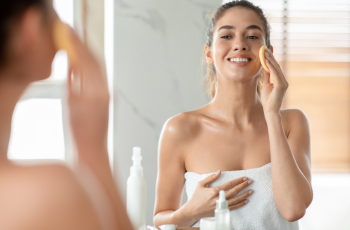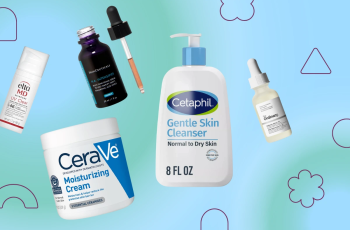
Can You Use Retinol While Breastfeeding? Here’s What You Need to Know
First of all—congratulations! After a long nine months, you’ve finally welcomed your little one. It’s an exciting, overwhelming, and beautiful time, especially as you settle into new routines.
Among the many questions you might have right now, one may be: Can I use retinol while breastfeeding? If skincare has always been part of your self-care routine, this question is entirely valid.
Let’s dive into this topic together. We’ll explore the safety of retinol during breastfeeding, alternative ingredients, and everything you need to know to care for your skin while keeping your baby safe.
⚠️ Important Note: Before introducing any new skincare product while breastfeeding, always consult your healthcare provider or a qualified dermatologist.
What Is Retinol?
Retinol is a vitamin A derivative known for its powerful anti-aging and skin-clearing properties. It’s often found in serums, night creams, and prescription retinoids like Retin-A or tretinoin.
Retinol helps:
Boost collagen production, Reduce fine lines and wrinkles, Treat acne and clogged pores, Fade dark spots and pigmentation, Improve skin texture and tone
It’s highly effective, but also very potent, making it a controversial ingredient during pregnancy and breastfeeding.
Why Is Retinol Not Recommended During Breastfeeding?
Retinol, when applied to the skin, can be absorbed into the bloodstream. Although this absorption is minimal, there’s a theoretical risk it could pass into breast milk and reach the baby.
There is no strong clinical data confirming that topical retinol is harmful to breastfeeding infants. However, due to the potential for harm, most doctors advise against its use during this time.
This caution is based on how oral retinoids, such as isotretinoin (Accutane), have been linked to serious birth defects. While oral and topical retinoids are different, they belong to the same family.
Out of an abundance of care, it’s generally advised to stop using retinol while nursing.
What Could Retinol Potentially Do to a Breastfed Baby?
Although there is no confirmed research showing how topical retinol affects nursing babies, scientists and doctors warn of potential risks:
Toxicity from high vitamin A levels, Possible interference with organ development, Unclear effects on neurological development, General unknowns due to lack of human studies
This is why most dermatologists and pediatricians agree: it’s better to play it safe and avoid retinol until breastfeeding ends.
Can I Use Retinol While Pregnant?
The answer here is much more direct: No.
Retinol during pregnancy can cause fetal retinoid syndrome, a serious condition resulting in:
Birth defects, Miscarriage, Premature birth, Facial and limb abnormalities
Even topical retinol should be avoided during pregnancy, as there’s a risk it could absorb into the bloodstream and affect fetal development.
How Long Before Pregnancy Should I Stop Using Retinol?
Although topical retinoids clear from the body fairly quickly—usually within 48 hours—most doctors recommend stopping retinol at least one week before trying to conceive.
This gives your body time to reset and ensures no leftover retinoids remain in your system once pregnancy begins.
What Skincare Ingredients Should I Avoid While Breastfeeding?
Besides retinol, there are a few other ingredients commonly found in skincare that are not recommended while nursing. Here’s a list to keep an eye on:
Retinoic acid, Tretinoin, Retin-A, Isotretinoin, Beta Hydroxy Acids (BHA) like salicylic acid, Diferin (adapalene), Benzoyl peroxide, Oxybenzone (common in some sunscreens)
These ingredients may be absorbed systemically or irritate sensitive skin. Some may even affect milk composition, though evidence is limited.
Always read ingredient labels carefully, and when in doubt, check with your healthcare provider.
What Skincare Ingredients Are Safe While Breastfeeding?
There’s good news—you don’t have to stop your skincare routine completely! Many ingredients are safe, nourishing, and effective while nursing.
Here are some safe skincare ingredients to look for:
Hyaluronic acid – for deep hydration, Niacinamide – for brightening and calming, Vitamin C – for antioxidant protection, Vitamin E – for moisture and healing, Lactic acid – for gentle exfoliation
Glycerin – for long-lasting hydration, Peptides – for plumping and firming
Avocado, jojoba, or almond oil – for nourishing the skin barrier
These ingredients are generally considered non-toxic, non-comedogenic, and safe for both you and your baby.
What Can I Use Instead of Retinol While Breastfeeding?
We understand the temptation to return to your favorite retinol serum—especially when you’re dealing with post-pregnancy skin changes like acne, dullness, or fine lines.
Thankfully, there are safe and effective retinol alternatives you can use while breastfeeding:
1. Peptides
Peptides are short chains of amino acids that signal your skin to produce more collagen and elastin. They improve firmness and elasticity without the harsh effects of retinol.
Peptides are gentle, safe, and hydrating, making them an ideal option for new moms.
2. Bakuchiol
This plant-based ingredient is often called the natural alternative to retinol. Bakuchiol has been shown to offer similar benefits:
Reducing wrinkles, Smoothing skin, Brightening tone
But without the irritation or risk.
Most studies suggest bakuchiol is safe during breastfeeding, but again, consult your doctor before use.
3. Lactic Acid
Instead of salicylic acid, try lactic acid, a gentle alpha hydroxy acid (AHA) that exfoliates the skin. It’s ideal for treating:
Uneven texture, Dull skin, Postpartum breakouts
Lactic acid is a safer option because its large molecular size limits how deeply it penetrates the skin.
How to Maintain a Skincare Routine While Breastfeeding
Even without retinol, you can still enjoy a glowing, healthy complexion. Here’s a safe and simple routine to follow:
Morning Routine:
Gentle cleanser (fragrance-free), Hydrating toner or essence, Vitamin C serum, Lightweight moisturizer with peptides, Broad-spectrum SPF 30–50
Evening Routine:
Cleanser to remove makeup and sunscreen, Lactic acid toner or serum (2–3 times a week), Niacinamide or hyaluronic acid serum, Peptide-based night cream or oil
Keep your routine minimal and stick to gentle, nourishing formulas that support your skin without irritation.
What If I Accidentally Used Retinol While Breastfeeding?
If you’ve applied retinol once or twice before realizing it’s not recommended, don’t panic. The absorption is minimal, and one-time use is unlikely to cause harm.
Here’s what to do:
Stop using the product immediately, Wash the area with gentle cleanser, Monitor for any signs of skin irritation, Let your doctor know for peace of mind
It’s the long-term, daily use of retinol that poses more concern, so catching it early is key.
When Can I Start Using Retinol Again?
You can safely reintroduce retinol into your skincare routine when:
You have fully weaned your baby
You are no longer breastfeeding
You have consulted with your doctor
Start slowly, as your skin may have become more sensitive. Begin with low concentrations once or twice a week, and always use SPF daily.
Final Thoughts: Is Retinol Safe While Breastfeeding?
To sum it up:
Retinol is not considered safe during breastfeeding
It can be absorbed through the skin and possibly affect your baby
Always consult your doctor before using retinoids or actives
Safe alternatives include peptides, bakuchiol, and lactic acid
You can still maintain a glowing, effective skincare routine without retinol
Your skin deserves care, even during this new chapter. Just be gentle, informed, and patient with yourself. After all, motherhood is the ultimate glow-up.

